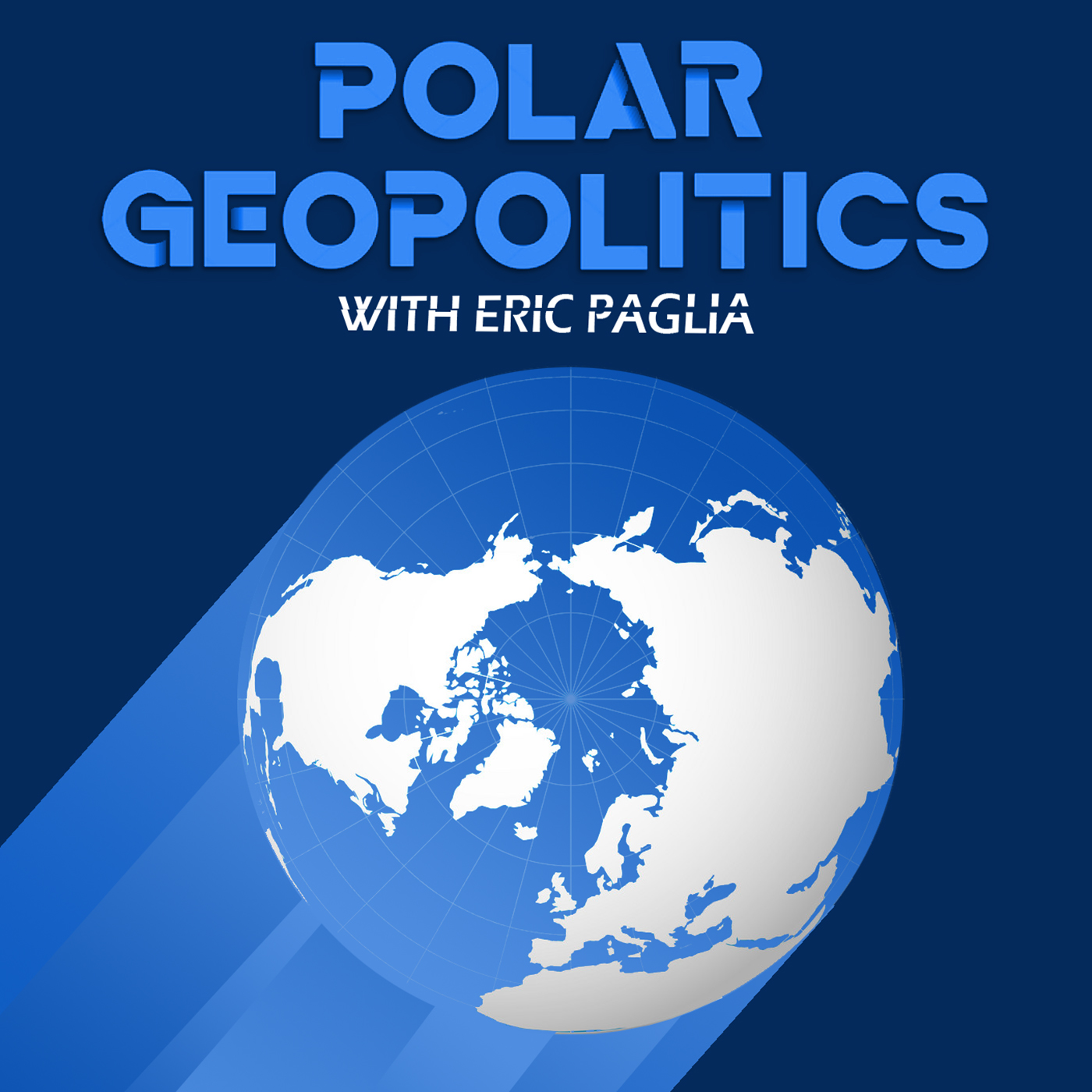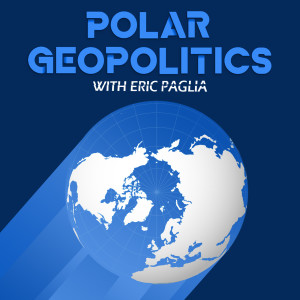
A podcast on the Arctic and Antarctica that applies the lens of geopolitics to analyze a wide range of critical issues pertaining to the polar regions and international affairs. In interviews with leading experts, recurring topics include Greenland, the Arctic Council, climate change, critical raw materials, the Antarctic Treaty System, hybrid warfare, science diplomacy, great power competition between the United States, China and Russia, sustainable development, Svalbard, NATO, Arctic shipping, Alaska, AI, technology and critical infrastructure, the Baltic Sea, military and national security, energy, the role of indigenous peoples in Arctic governance, and more. Polar Geopolitics is hosted by Dr. Eric Paglia, a podcast producer and environmental historian at KTH Royal Institute of Technology in Stockholm, Sweden.
A podcast on the Arctic and Antarctica that applies the lens of geopolitics to analyze a wide range of critical issues pertaining to the polar regions and international affairs. In interviews with leading experts, recurring topics include Greenland, the Arctic Council, climate change, critical raw materials, the Antarctic Treaty System, hybrid warfare, science diplomacy, great power competition between the United States, China and Russia, sustainable development, Svalbard, NATO, Arctic shipping, Alaska, AI, technology and critical infrastructure, the Baltic Sea, military and national security, energy, the role of indigenous peoples in Arctic governance, and more. Polar Geopolitics is hosted by Dr. Eric Paglia, a podcast producer and environmental historian at KTH Royal Institute of Technology in Stockholm, Sweden.
Episodes

Friday Feb 25, 2022
Friday Feb 25, 2022
The tensions in Arctic relations that began after the 2014 Crimea crisis will in all likelihood be greatly exacerbated by the Russian invasion of Ukraine. Could the new security situation in Europe, together with the increased military activity in the High North in recent years, lead to an Arctic arms race? Russia and Arctic expert Mathieu Boulègue, a research fellow at the Russia and Eurasia programme at Chatham House, joins the podcast to provide a real time analysis of the war in Ukraine, the new geopolitical reality in Europe, and the potential implications for Arctic security.

Wednesday Feb 16, 2022
Wednesday Feb 16, 2022
Camp Century, a 1960s US Army base embedded in the Greenland ice sheet, was not only a High Arctic test site for advanced technologies—including a modular nuclear reactor—and secret military schemes at the height of the Cold War, but also a seminal location for the extraction of ice cores that would become an important baseline for modern climate science. Associate professor Kristian H. Nielsen of Aarhus University, who-coauthored a definitive account of this fascinating chapter of Cold War history, “Camp Century: The Untold Story of America's Secret Arctic Military Base Under the Greenland Ice” (Columbia University Press, 2021), joins the podcast to discuss this audacious geostrategic initiative and its enduring afterlife that has continued to complicate Denmark-US-Greenland relations for over 60 years.

Monday Dec 20, 2021
EU Arctic Policy and Geopolitics with Amb. Michael Mann
Monday Dec 20, 2021
Monday Dec 20, 2021
The European Union updated its Arctic policy in October with a communication that took a strong stand on climate change—calling for hydrocarbons to be left in the ground—and pronounced its status as an Arctic geopolitical actor that would assert its interests across the circumpolar North. Ambassador Michael Mann, the EU Special Envoy for Arctic Matters, joins the Polar Geopolitics podcast for an in-depth discussion on the multiple dimensions of the European Union’s engagement in the Arctic, from interactions with Russia, China and the United States, to plans for opening an EU office in Greenland, and its ongoing quest to become an Arctic Council observer.

Tuesday Dec 07, 2021
Brazil and the Antarctic Geopolitics of South America
Tuesday Dec 07, 2021
Tuesday Dec 07, 2021
Despite asserting itself as a regional and global power, Brazil has traditionally taken a back seat to Chile and Argentina in terms of the Antarctic geopolitics of South America. Why has this been the case, and will Brazil continue its somewhat limited engagement relative to the extensive Antarctic programs of its neighbors? Ignacio Javier Cardone, author of the new book "The Antarctic Politics of Brazil: Where the Tropic meets the Pole" joins the Polar Geopolitics podcast to explain the evolution and future prospects of Brazilian activity in Antarctica, as well as the wider Antarctic geopolitics of Argentina, Chile and other countries of South America.

Monday Jul 19, 2021
Making the case for the controversial Davis Aerodrome in East Antarctica
Monday Jul 19, 2021
Monday Jul 19, 2021
Australia’s plans to build a 2.7 km airstrip and other infrastructure in the ice-free Vestfold Hills near its Davis Station in East Antarctica have been heavily criticized, primarily on environmental grounds. The aerodrome, which Australia contends would improve scientific access to the continent and facilitate search and rescue operations, could also have an array of geopolitical implications. Antarctic legal expert Jeffrey McGee, an associate professor at the University of Tasmania in Hobart who has come out in support of the project, recently co-authored a report for the Australian Strategic Policy Institute, “All-weather aerodrome in Antarctica would be a gamechanger for Australia”. Dr. McGee joins the podcast to explain the strategic rationale and current status of the aerodrome and why he believes, if the plans go forward, it would not only benefit Australia but also other Antarctic stakeholders.

Thursday Jun 17, 2021
Science and geopolitics in Svalbard: the Ny-Ålesund Research Station
Thursday Jun 17, 2021
Thursday Jun 17, 2021
Hosting scientific facilities representing 12 countries, the Ny-Ålesund Research Station in Svalbard is perhaps the most international location in the Arctic. The former coalmining community, which Norway has over the past 30 years transformed into a leading center of Arctic research, also serves a geopolitical function for many of the states represented there. Associate Prof. Maarten Loonen from the Arctic Center at the University of Gröningen has since the late-1980s been a first-hand witness and participant in Ny-Ålesund’s transformation. Currently the chairman of the Ny-Ålesund Science Managers Committee, Dr. Loonen joins the podcast to discuss the international dynamics and underlying geopolitics of Ny-Ålesund, and recent changes that portend potentially significant changes in the community’s future development. Articles mentioned on the podcast: T Pedersen (2021): The politics of research presence in Svalbard and E Paglia (2020): A higher level of civilisation? The transformation of Ny-Ålesund from Arctic coalmining settlement in Svalbard to global environmental knowledge center at 79° North

Friday Apr 16, 2021
Friday Apr 16, 2021
Could the incident of the Ever Given running aground in the Suez Canal, disrupting global trade for six days, be a turning point that leads to an expansion of container shipping along the Northern Sea Route and other Arctic passages? Or will the risks and costs associated with Arctic shipping, even when taking climate change and geopolitics into consideration, continue to exceed those of established Europe-Asia routes for decades to come? On this episode, the Polar Geopolitics podcast takes up these and other questions with shipping industry expert Lars Jensen, CEO of Sea Intelligence Consulting in Copenhagen, Denmark.
Monday Mar 01, 2021
Monday Mar 01, 2021
On this episode, Prof. Caroline Kennedy-Pipe—an Arctic, Russia and Cold War expert at Loughborough University in England—analyses the emerging great power competition in the Arctic by providing a longer-term perspective on the geopolitical dynamics and developments in the circumpolar North over the past forty years. This period encompasses the close of the Cold War, the rise of international cooperation in the Arctic, and key shifts in the geopolitical position of Russia in the region and the world. Prof. Kennedy-Pipe also reflects on the role of ideology and how differing conceptions of sovereignty influence state actors in the Arctic.
